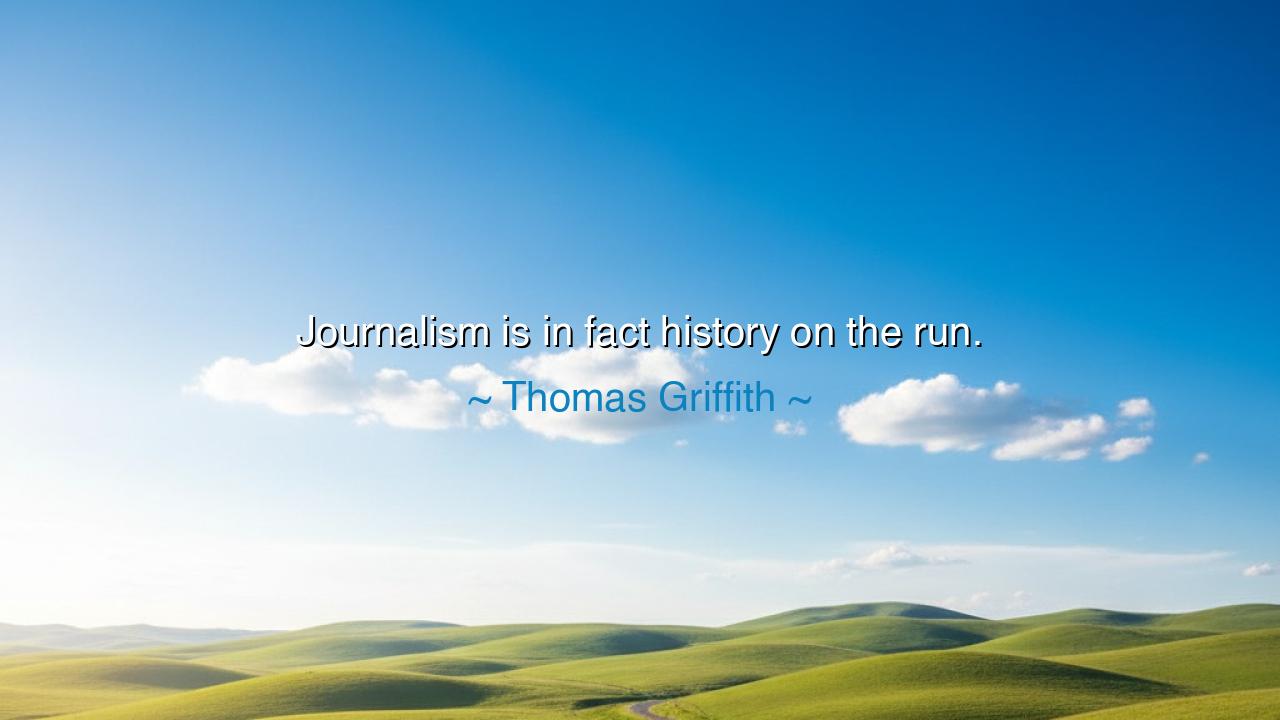
Journalism is in fact history on the run.






“Journalism is in fact history on the run.” – Thomas Griffith
These words, spoken by Thomas Griffith, are both a reflection and a warning — a revelation of the sacred and perilous duty that falls upon those who chronicle the living world. In a single phrase, he captures the fleeting, breathless nature of journalism, that art of recording events as they unfold — of catching the motion of time before it vanishes. To call it “history on the run” is to understand that the journalist is the historian’s shadow, racing beside the storm of the present, seeking to gather truth before it is lost to memory or distortion. In this way, Griffith reminds us that every news report, every article, every witness’s word is but a fragment of history still in motion, still shaping its final form.
In the age of the ancients, historians were the keepers of the world’s memory. They wrote with the distance of years, reflecting upon victories and defeats long settled. But the journalist is the historian of the moment — writing while the dust of battle still hangs in the air, while the fire of emotion still burns. Where the historian sees through the lens of time, the journalist sees through the fog of immediacy. This makes their work both vital and fragile, for truth in motion is easily blurred. To write “history on the run” is to chase clarity amid confusion, to seize fragments of light before the darkness of forgetfulness closes in.
Consider the reporters of World War II, who stood amid ruin and fire to capture the world’s pain for those who could not see it. Men like Ernie Pyle, who walked alongside soldiers through mud and death, writing not of glory, but of fear and courage, of the weary heart of humanity. His words became the soul of that war’s living history — not yet the polished record of books, but the heartbeat of reality itself. Later generations would read those lines and know what it felt like to stand in that moment, to breathe the same air as history being born. Pyle and his kind were not merely reporters; they were witnesses to the shaping of destiny. They ran beside time — and caught it.
Yet Griffith’s words also carry a warning: that journalism, being history in motion, is vulnerable to error, bias, and manipulation. When the chronicle is written too swiftly, the truth can stumble and fall. The speed of the present tempts many to report before they understand, to speak before they listen. The ancients taught that wisdom comes with patience, yet journalism demands haste. The noble task, then, is to balance urgency with integrity — to pursue truth as swiftly as lightning, yet as steadily as the rising sun. For though history on the run may be chaotic, it must never become careless.
In every age, the power of journalism has shaped nations. When the Berlin Wall fell, it was journalists who carried the image of its crumbling stones to every corner of the earth — transforming an event into a symbol of liberation. When tyrants sought to hide their crimes, it was journalists who brought them to light, risking imprisonment and death so that truth might endure. Their reports, written in haste, became the first drafts of history, the raw foundation upon which all later understanding would rest. Thus, journalism is not merely the act of reporting — it is the act of preserving the human story before it is rewritten by power or lost to silence.
To see journalism in this light is to honor it as a sacred trust. The journalist, like the scribe of old, stands between the world’s chaos and its remembrance. Every question asked, every word written, is a defense against oblivion. For when truth is ignored, history is distorted; when truth is silenced, history dies. Griffith’s insight calls upon all who bear witness to the present — not only journalists, but all who speak of what they see — to treat their words with reverence. For even the smallest account may one day become the seed from which understanding grows.
So let this teaching take root in your heart: speak the truth of the moment, for tomorrow it will become history. Whether you write for nations or whisper your thoughts to a friend, you are a chronicler of your time. Observe carefully, think deeply, and remember that your words, like arrows, may pierce centuries. The present is a wild and running thing — swift, elusive, and alive — and journalism is the hand that dares to grasp it. May those who take up this work do so with courage, humility, and devotion to truth, knowing that they do not merely record the world — they preserve its soul.






AAdministratorAdministrator
Welcome, honored guests. Please leave a comment, we will respond soon